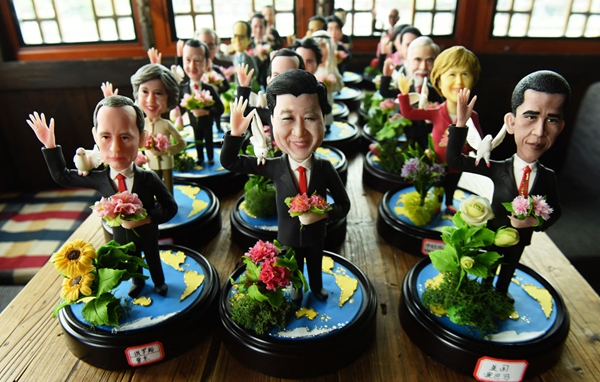US-China relations in the wake of the Hangzhou G20
- By Tim Collard
 0 Comment(s)
0 Comment(s) Print
Print E-mail China.org.cn, September 19, 2016
E-mail China.org.cn, September 19, 2016
|
|
|
Hangzhou craftsman Wu Xiaoli displays her colorful clay figurines depicting the G20 leaders, including Xi Jinping, US President Barack Obama, and Russian President Vladimir Putin, on August 28. |
The timing of this month's G20 summit in Hangzhou was somewhat tricky in the context of Sino-U.S. relations. After all, we are approaching the end of Barack Obama's presidency, which means, firstly, that neither side can be entirely confident the relationship will be able to remain unscathed by the forthcoming presidential elections, and, secondly, President Obama is concerned about his legacy once he has completed his two terms as President and must retire.
Obama, along with his two experienced Secretaries of State, Hillary Clinton and John Kerry, has shown commitment to relaxing tensions in the Sino-U.S. relationship, looking for agreements and compromises where possible.
The most impressive example was the spectacular announcement, on the eve of the G20 summit, that the two countries would ratify the Paris Climate Change Agreement of December 2015. Given that China and the United States are the world's two leading producers of greenhouse gases, together accounting for 39 percent of global emissions, this is a hugely significant agreement.
The Paris agreement can only come into force when at least 55 nations ratify it, providing they together represent 55 percent of global greenhouse gas output. That target has not yet been achieved, but the action of China and the U.S. is a vital step giving impetus to the process.
This is not just about a single environmental agreement. Its real significance is that highly developed and developing countries, necessarily asymmetrical, have managed to agree on cooperation in an area previously featuring fierce competition between established markets and developing markets that naturally want to compete fairly.
The message that Obama is transmitting is that the U.S. is no longer behaving as a dominant partner, but is engaging with the leading country in the developing world on a basis of absolute equality.
This is important. Inevitably, during a U.S. election campaign, nationalistic and sometimes protectionist noises are made by candidates in the scramble for votes. In the U.S. there is always a degree of anti-Chinese sentiment in the public sphere at such times, as fear of competition from a newly-resurgent China tends to engender voter fears over jobs.
As a responsible national leader, Barack Obama is concerned that a firm basis of cooperation should be laid in relations with China that won't be easy for any future administration to undermine. Clearly not every matter for dispute can be resolved in the short term; but Obama is looking to the medium term, to the next administration, which will have to engage on equal terms with China just as he has done.
And this is not just an aspiration. Presidents Xi and Obama have set out some practical measures for cooperation over the next few years that will be hard to ignore.
They have pledged their support for the establishment of a global standard, set not by governments but by market mechanisms, aimed, for example, at ensuring carbon-neutral growth in international aviation from 2020 onwards.
China expects to participate in this mechanism from 2021. The UN's aviation agency, the International Civil Aviation Organization (ICAO), meets shortly to discuss this further.
One of President Obama's main aims for his visit to China was to convince countries of the region that his "pivot to Asia" was not motivated by a bid for U.S. hegemony, but for stabilization of a largely economic relationship. He made a forceful case for ratification of the Trans-Pacific Partnership (TPP), intended as the basis of trading relations across the Asia-Pacific region.
Here, the president is doing his best to establish the principle of free trade, hoping to ensure that the forces of protectionism raised by the current election campaign will not be able to take root. However, it's doubtful whether, in the current state of U.S. politics, it will be possible to have an agreement such as TPP ratified by Congress.
Should the TPP negotiations fail, especially if that is matched by a failure in the negotiations over the proposed trans-Atlantic agreement TTIP (with Europe) this will be a severe reverse for Obama's foreign trade policy in the last months of his presidency.
Anyway, he has done his best. He has demonstrated the huge importance any American president must place on maintaining good relations with China, and a solid trading system with East Asia as a whole. His intention was to ensure a basis for solid cooperation with China that his successors will not readily wish to put at risk, and I think he has succeeded.
Tim Collard is a columnist with China.org.cn. For more information please visit:
http://www.ccgp-fushun.com/opinion/timcollard.htm
Opinion articles reflect the views of their authors, not necessarily those of China.org.cn.






